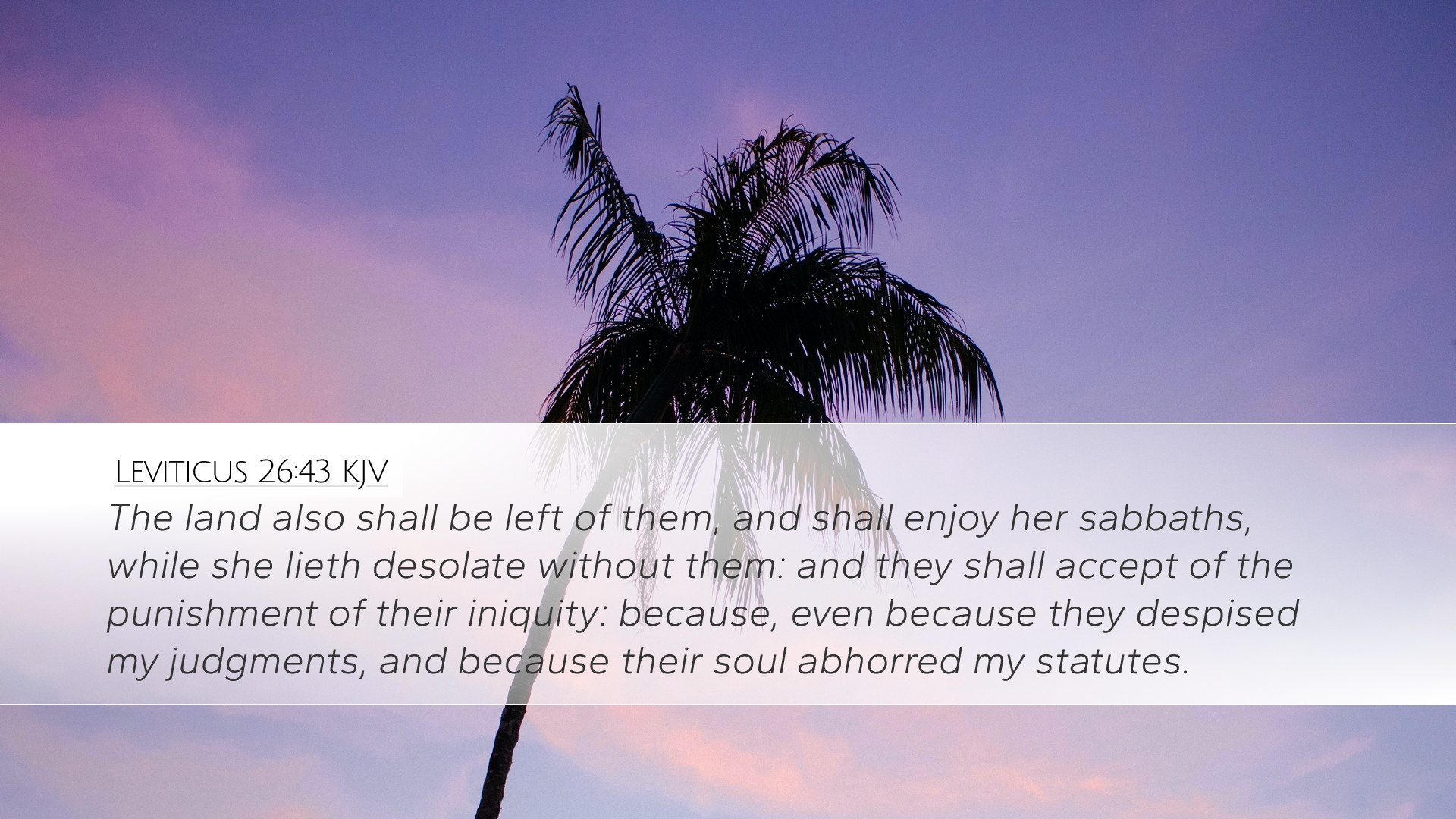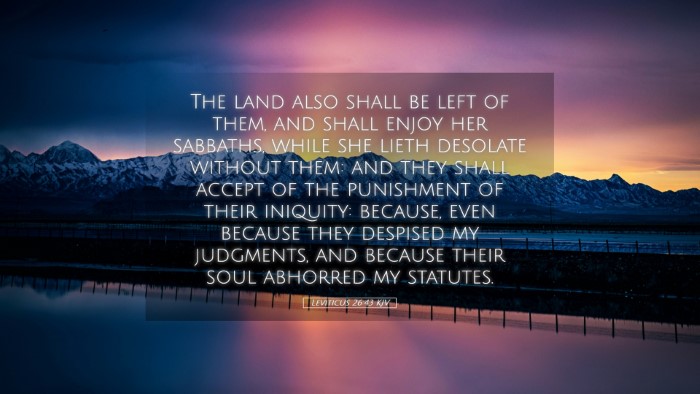Commentary on Leviticus 26:43
Verse Text: “The land also shall be left of them, and shall enjoy her sabbaths, while she lieth desolate without them: and they shall accept of the punishment of their iniquity: because, even because they despised my judgments, and because their soul abhorred my statutes.”
Introduction
Leviticus 26:43 serves as a pivotal point in the concluding statements of God’s covenant with Israel. It encapsulates themes of divine judgment, the consequences of disobedience, and the redemptive possibility inherent in God’s character. This commentary draws upon insights from respected public domain sources to unpack the layered meanings within this verse.
The Context of Leviticus 26
Matthew Henry notes that Leviticus 26 presents a series of blessings and curses contingent upon the obedience of the people. The chapter culminates with a stark warning of the consequences of turning away from God’s commands. Verses preceding 43 detail the dire punishments awaiting the Israelites if they forsake their covenant with God.
Historical and Theological Importance
- Covenant Relationship: God’s covenant with Israel is foundational to understanding the implications of their disobedience. Disregarding this covenant results in severe repercussions, not just for the individuals, but for the land itself.
- Divine Judgment: Albert Barnes emphasizes that the desolation of the land reflects the seriousness with which God views His statutes and commands. It acts as a physical manifestation of spiritual neglect.
- Restorative Opportunity: Adam Clarke points out that even in judgment, there exists a possibility of restoration, illustrating God's enduring mercy.
Exegesis of Key Phrases
To fully appreciate the depth of Leviticus 26:43, a careful examination of key phrases is essential. Each term and idea contributes significantly to the overall understanding of covenant faithfulness.
“The land also shall be left of them”
This phrase indicates a profound separation—both the people from their God and the land from the people. Matthew Henry remarks that this abandonment symbolizes the ultimate consequence of straying from divine commands. The land, a gift from God, becomes uninhabitable when His people forsake Him.
“Shall enjoy her sabbaths”
Barnes elucidates that the sabbath rest of the land symbolizes the divine order and rhythm God established. The land’s enjoyment of its sabbaths while lying desolate reveals that even creation yearns for alignment with God’s will. This highlights the importance of whole-life holiness—not only the behavior of the people but the stewardship of the land.
“Accept of the punishment of their iniquity”
Here, Clarke reflects on the acknowledgment of guilt as a necessary step in redemption. The phrase emphasizes that recognition and acceptance of wrongdoing precede the restoration of relationship with God. It highlights the call to repentance and the weight of sin that must be borne.
Theological Themes
Leviticus 26:43 encapsulates several vital theological themes relevant for pastors, students, and scholars alike:
- The Justice of God: The verse is a declaration of God’s justice. His judgments, as emphasized by Henry, reflect His holiness and righteousness. God cannot overlook sin, and the consequences are a testament to His character.
- Sovereignty and Control: God’s sovereignty over creation is portrayed here. The land’s desolation is a direct result of human actions but, ultimately, conducted under God's divine will.
- Restoration and Repentance: While this verse highlights punishment, it also lays the groundwork for understanding repentance and restoration. Clarke notes God's willingness to restore the repentant heart, showing that the covenant relationship is not entirely severed.
Pastoral Applications
For modern pastors and churches, Leviticus 26:43 offers rich insights for preaching and teaching:
- Covenant Faithfulness: Encourage the congregation to remain faithful to God’s word. The implications of neglect serve as a warning for contemporary believers (Barnes).
- Recognition of Sin: Emphasize the importance of confession and repentance within the life of the church today. Clarke’s insights here are pertinent; acknowledging sin is the first step toward restoration.
- Care for Creation: The connection between human behavior and the state of the land can spark conversations about stewardship and environmental care as a spiritual duty.
Conclusion
Leviticus 26:43 stands as a significant reminder of the interplay between human actions and divine response. The theologians’ insights from Henry, Barnes, and Clarke enrich our understanding of this verse, providing a multi-faceted view of God’s nature and His desires for us. It challenges readers to reflect on their relationship with God, urging the faithful to maintain a covenantal fidelity that honors God's statutes for the sake of both spiritual and earthly well-being.


